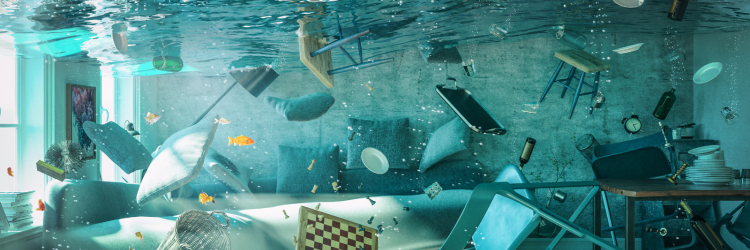As much damage as Hurricane Helene has caused — and this one is really bad — it also sends a truly ominous warning about future storms because of something known as the "brown-ocean effect."
Atlantic hurricanes lose force as they move inland, because they no longer have access to the warm water that provided their energy in the first place. But Helene stayed far stronger than normal as it moved north.
The governor of Georgia said it was like a 250-mile-wide tornado as it moved through the state. Helene dumped more than 32 inches of rain on parts of western North Carolina and devastated the area. The state is some 450 miles north of the Gulf of Mexico and historically has just had to deal with the dying remnants of such major storms.
Why didn't Helene fade as quickly as prior hurricanes have? Scientists say the reason may be the "brown-ocean effect."
And they worry that future storms may mimic Helene, meaning we may have to now worry about a hurricane alley reaching well up into Appalachia.
The "brown-ocean effect" can occur when the ground the storm is covering is hot and already saturated by rain. The storm is thus traveling over a sort of brown ocean — made of dirt but still with an awful lot of warm water available to keep powering the winds and supplying the torrential rain.
In the case of Helene, it caused so much rain in advance of the main body of the storm as it moved north that it may have created its own brown ocean that the storm could feed off.
We've already been seeing hurricanes intensify much more rapidly than the historical norm because ocean waters are so warm — Helene itself quickly went from a Category 1 hurricane to a Category 4 right before making landfall in Florida. Scientists now worry that these more intense hurricanes could, like Helene, reach much farther inland.
A New York Times article on the possible role of the "brown-ocean effect" in Hurricane Helene cited earlier hurricanes where it was a factor:
"Past research has found that [the effect] helped keep Hurricane Ida in 2021, Tropical Storm Erin in 2007 and other tropical disturbances chugging along for longer. 'Instead of just winding down, they just maintain their intensity and in some cases perhaps intensify,' [Marshall Shepherd, the director of the University of Georgia’s atmospheric sciences program,] said."
He added: "'The fact that we’re just seeing these hurricanes penetrate farther inland as hurricanes, I think that is a harbinger of things perhaps to come in our state and even in the Appalachia region.'”
I dearly hope my fears are overblown. The region has already been hit so hard. As our colleagues at the Triple-I noted last week, Helene is "the fourth hurricane to make landfall in the U.S. this year and the fifth hurricane to slam storm-weary Florida since 2022. [This is] the third consecutive year Florida has incurred a major hurricane landfall. Additionally, this [is] the third hurricane to make landfall in the Big Bend over the past 13 months."
But there doesn't seem to be any respite in sight — in fact, more storms are forming in the Atlantic. And I think the "brown-ocean effort" could worsen their effects.
Stay safe.
Paul
P.S. There were quite a number of interesting pieces in the past few days related to extreme weather. Among them:
- Zillow says its for-sale listings "will now feature detailed climate risk information for five key categories — flood, wildfire, wind, heat and air quality — along with insurance recommendations."
- The Washington Post has a fascinating piece about a Tampa hospital that used something called AquaFence to set up a temporary floodwall and protect it from Helene.
- Despite all the concerns about hurricanes and rising sea levels, the Washington Post reports that people keep moving to highly vulnerable areas such as Galveston.
- In the same vein, the New York Times has a long, informative piece about people moving to areas that are increasingly susceptible to all manner of perils.
- Finally, the Washington Post reports that the U.K., home of the Industrial Revolution, has shut down the last of its coal-burning power plants. No, that doesn't have anything directly to do with the hurricanes or other catastrophes we're currently facing, but I still count the development as a milestone in our attempts to limit climate change.


